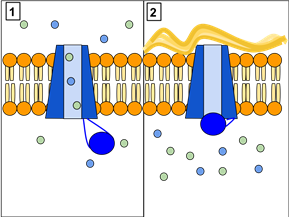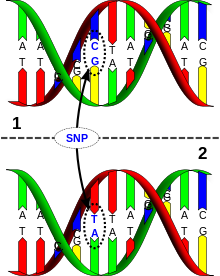Overview of techniques involved (e.g. 'omics')
2. Genomics
2.3. DNA as a Biomarker
Why would we want to sequence other humans’ genomes if we have already sequenced one? The answer is that much of what makes humans ‘individuals’ is determined by many small differences in our DNA. Small differences in our DNA often still result in working proteins. Yet, some variations stop a protein being produced or lead to the production of a protein that does not work properly. Some of these variations are explained later in the text.
Mutations are variations in DNA sequence. These can occur, for example, when sections of DNA are lost (deleted), or inserted into new positions within a length of DNA. Mutations can affect the structure of the protein that a gene encodes. In some cases, they can therefore affect the health of an individual. Mutations are relatively rare - they are only found in a few people.
For example, cystic fibrosis is caused by mutations in the CFTR gene. As explained in Figure 3, this affects the function of a protein which helps produce mucous in the lungs and in other parts of the body. The mucous becomes unusually thick and sticky, and this leads to breathing problems and bacterial infections in the lungs.
CFTR protein channel

Figure 3: The CFTR protein is a channel protein that controls the flow of H2O and Cl- ions in and out of cells inside the lungs. Panel 1 shows a CFTR protein which works correctly. As you can see, ions flow freely in and out of the cells. Panel 2 shows a CFTR protein that does not work as it should. Here, theions cannot flow out of the cell because a channel is blocked. This causes cystic fibrosis, which leads to a build-up of thick mucus in the lungs. Created by Lbudd14, under Creative Commons CC BY-SA 3.0 (http://en.wikipedia.org/wiki/Cystic_fibrosis#mediaviewer/File:CFTR_Protein_Panels)
SNPs (single nucleotide polymorphism) are the simplest form of variation in DNA sequence. This is a change in a single base pair, for example a length of DNA might read AATGC and a SNP might change this to AGTGC. SNPs are relatively common and they are found in many people. They can occur within genes and in other parts of the DNA sequence that do not contain information to build up proteins. Most SNPs do not affect an individual’s health.
SNP DNA molecule

Figure 4: DNA molecule 1 differs from DNA molecule 2 at a single base-pair location (in this case, it is a C/T polymorphism). Created by David Hall, under Creative Commons licence CC BY 2.5 (http://en.wikipedia.org/wiki/Human_genetic_variation#mediaviewer/File:Dna-SNP.)
Researchers can perform genome wide association (GWA) studies by using whole genome sequencing. GWA studies link variations between people with differences in their health, disease and their response to treatment.
GWA studies can identify DNA variants that are useful as biomarkers. Other studies that look at specific ‘candidate’ genes can also do this. These are studies that look at the link between a specific gene and disease. They are more focused than a GWA study that looks at the whole genome. This is becoming a very fruitful area of research, even though the relationship between specific variants and disease is not simple in most cases. Often, there are many variants associated with a disease, not just one. In addition, the impact of epigenetic changes can complicate the picture. Epigenetic changes are changes in the way that genes are switched on and off without a change in the DNA sequence.